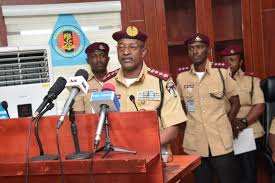Speaking at the 2025 Half-Year Strategy Session held in Abuja on Wednesday, Mohammed delivered a firm directive to commanding officers, urging them to address emerging behavioural threats within the agency and uphold discipline across all levels. This year’s session was themed Driving Change from Within: Reinforcing Integrity, Accountability, and Performance.
“Reports reveal that there are challenges in our enforcement operations due to patrol misconduct, rising cases of indiscipline, bribery and corruption, poor command oversight, absenteeism, drug abuse, and increasing incivility toward motorists,” he said. “These are major factors affecting our internal administrative control and negatively impacting on our performance. It has also created deep concerns among Nigerians who have placed a high premium on our ability to deliver on our mandate.”
The corps marshal emphasised that commanders must take responsibility for the conduct of their personnel, warning that inaction could damage the Corps’ institutional integrity. “Commanding officers must put in effort to manage emerging behavioural threats affecting our productivity and public perception. COs must identify changes in behavioural patterns and establish possible causes and apply the required disciplinary sanctions,” Mohammed said.
Calling for a cultural shift within the Corps, he added, “We need to focus on leadership responsibility and enforcing the chain of command in order to restore discipline across commands. We need to confront the culture of compromise and address the ethical decay in the Corps which is affecting our integrity and public perspective.”
Mohammed urged officers to recommit to professionalism and accountability, noting that the Corps must begin to reward performance while penalising misconduct. “There is a need to enforce standards against absenteeism, apathy and duty abandonment in the Corps; as well as reward performance and accountability as a motivating factor for improvement in the system,” he stated.
With dwindling budgetary support, the corps marshal also charged field officers to adopt innovative strategies to maintain operational efficiency. “COs must be innovative in strategic partnerships in the face of funding challenges. We must improve our relationship with State Governments to support some of our critical operations,” he added.
Despite internal challenges, the FRSC has recorded notable achievements on the global stage. Nigeria recently won the Kofi Annan Road Safety Award for Best in Road Safety Management in Africa and was elected host of the Permanent Secretariat of the African Association of Road Safety Lead Agencies. “These achievements have translated the status of the FRSC into a lead agency in road safety administration in Africa,” Mohammed said, crediting the dedication of FRSC personnel and the backing of the Federal Government.
In a bid to strengthen the Corps legislatively, Mohammed highlighted progress on the FRSC Amendment Bill, which recently passed the House of Representatives and awaits Senate concurrence. The bill proposes renaming the agency to the Nigeria Road Safety Commission, expanding its jurisdiction to all public roads, and establishing a special armed squad.
“The FRSC Establishment Act 2007 will change to The Nigeria Road Safety Commission Act 2024. The Federal Road Safety Corps will now be known as Nigeria Road Safety Commission; the scope of operations of the NRSC will cover all public roads; the salaries of CM, DCMs and ACMS shall be consolidated; a special Armed Squad shall be established for the NRSC; amongst others,” he explained.
FRSC Advances Institutional Reforms and Strengthens Inter-Agency Collaboration to Enhance Road Safety




Awesome! Its genuinely remarkable post, I have got much clear idea regarding from this post